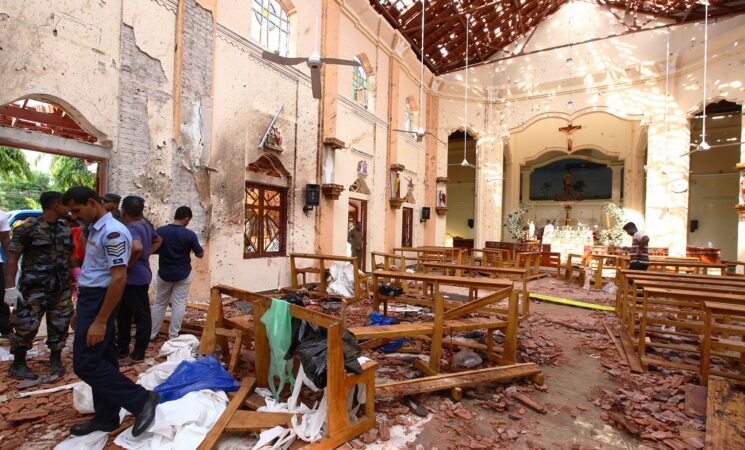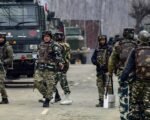24 May 2019, NIICE Commentary 2389
Dr. Aditi Paul
On Easter Sunday, 21 April 2019, a series of terrorist attacks took place in the island nation of South Asia –Democratic Socialist Republic of Sri Lanka. The blasts were carried out in churches and hotels in Colombo, Negombo and Batticalao. Close to 260 people were killed and many injured.Apart from the local Sri Lankans, many foreign tourists were affected and killed belonging to states like Bangladesh, Spain, japan, Portugal, Denmark, Turkey, USA, etc.
The reigning head of the Islamic State in Iraq and Syria (ISIS), Abu Bakr al-Baghdadi, has claimed the responsibility of the attacks. It has been established by the investigative reports that National Thawheed Jamath (NTJ) and Jammiyathul Millathu Ibrahim (JMI), two local radical groups linked to ISIS, carried forward the blasts.
Post-attacks the government of Sri Lanka declared state emergency, indefinite curfew was issued, schools were closed, temporarily restrictions to access popular social media channels was laid, the wearing of burqa and niqab for all was banned, and people traveling to Sri Lanka were advised by their respective governments to not make any non-essential trip.
Burning Questions
It has now come to the forefront that these attacks took place due to the shear negligence of the Sri Lankan government. Despite a warning to the Sri Lankan intelligence agencies by India, neither the Sri Lankan government took it seriously, nor the local people were alerted. Moreover, the Sri Lankan Prime Minister Ranil Wickremesinghe claims to be aware of the alerts sent by the Indian government and other international agencies about a possible attack during Easter by NTJ yet failed to execute a counteraction.
Undoubtedly, the incident raises a lot of questions. After a decade of peace how did Sri Lanka become the victim of a large-scale devastating terrorist attack? What were the shortcomings in the management of the internal state security after Rajapaksa’s group? Why was the Sri Lankan government slow to act tactfully? Why did an international terrorist organization like ISIS choose Sri Lanka for the attack and not any other state of South Asia? How did the local radical groups residing in Sri Lanka organize and provide support to mobilize a massive attack planned by the ISIS? How to prevent recurrence of attacks that are a case of religious extremism with transnational terrorist linkages in South Asia?
Why Target Sri Lanka?
The ISIS is a terrorist organization which spreads the message of war and hatred by propagating all the wrongs done against the Muslim community. They make an active usage of the internet for radicalizing violence across the world and motivate the youth towards extremist ideologies. Modern technological methods and social media channels is used extensively by ISIS to build its network and convince the Muslims world over to join. And in this way along with the message of religious doctrines, the ISIS justifies its motives and actions.
Being an island state, Sri Lanka is enveloped by sea and therefore is an easy access for intruders. Ethnic tensions in Sri Lankan provinces is a common phenomenon. And, this acts as a breeding ground to instigate more anger and violence. Now, the ISIS is influencing and increasing its sphere in South Asia. What is interesting is that the ISIS has not targeted the Sinhalese who is the majority ethnic group. Christians, who are mere 10 percent of the total population of Sri Lanka were targeted. Since Baghdadi has claimed that the attacks were an answer to the shooting at Muslims in New Zealand, it can be speculated that the dissatisfied Muslims in Sri Lanka are retaliating by cooperating with ISIS.
This also opens a discussion on funding. Looking at the well-orchestrated blasts, some sort of funding and technical help is happening from the Sri Lankan organizations itself. Moreover, the involvement of trained foreign support is also evident. Without it, the local anti-government militants in Sri Lanka could not have shown this level of coordination and skills.
Need for Regional Response
One most important task ahead of the Sri Lankan government is to rectify its mechanism, take up issues on urgent basis and speed up their internal communications. The present weak internal institutional structure of the Sri Lankan government can and is playing havoc to the state security apparatus.
The Foreign Minister leading the Sri Lankan delegation, Tilak Marapana, to the 16th Ministerial Meetings of Asia Cooperation Dialogue held on 1 May 2019, emphasized on concerted efforts by all states and not let terrorism affect negatively the social and economic developments of states. Sri Lanka needs not just internal checks but support from the neighbors for managing terrorism.
Being closest to Sri Lanka, India undoubtedly must scale up its vigilance and monitoring of terror attacks, especially because India like Sri Lanka is also home to ethnic and religious tensions. Moreover, India has to bolster its role of a maritime power and ensure the security of the Indo-Pacific region. One cannot overlook the fact that both 2008 Mumbai attack and the current one in Sri Lanka came from the sea.
Just creating awareness is not enough, especially at a time when terrorism has been hitting home. Keeping different standpoints on the same issue will never lead to a comprehensive agreement. And, this is precisely the problem in regional cooperation in South Asia. Realizing that Pakistan is yet to understand the ill-effects of Islamic militancy and not keep using it as a threat, an acceptable alternative could be a sub-regional agreement on terrorism in which politically like-minded members can come together to share information as well as operationalize a counterplan.
Terrorism is not local or regional in nature. It is a global phenomenon and therefore the measures to control it has to come from all states.This is a good enough reason for the region of South Asia to unite and construct a regional framework or convention on terrorism. South Asian Association for Regional Cooperation (SAARC) has a convention called the SAARC Regional Convention on Suppression of Terrorism, but it needs to be given more authority and powers. The time cannot be better than now to turn SAARC into a robust organization and act on regional security issues.




